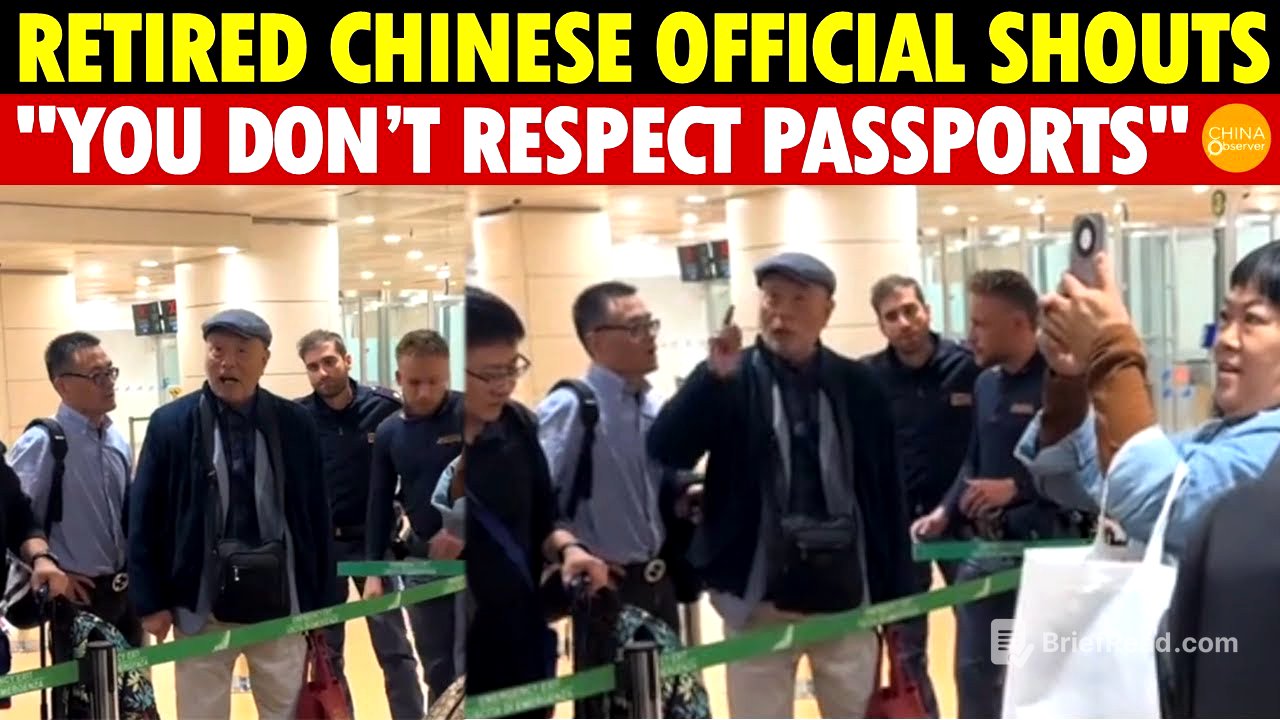TLDR;
This video examines instances of perceived discrimination and inappropriate behaviour involving Chinese tourists abroad, exploring the underlying causes and impact on China's global image. It covers incidents in Italy, Thailand, and Japan, highlighting issues such as long customs delays, tour guide misconduct, and violations of local customs. The video also touches on the role of the Chinese Communist Party's propaganda and the erosion of traditional values in shaping certain behaviours.
- Incidents of perceived discrimination and inappropriate behaviour involving Chinese tourists abroad
- Underlying causes, including propaganda and erosion of traditional values
- Impact on China's global image
Airport Incident in Italy [0:02]
An elderly Chinese man caused a commotion at an Italian airport due to long customs wait times, shouting that Chinese people were being discriminated against and urging others to protest. This sparked debate online, with some suggesting his behaviour stemmed from a sense of entitlement fostered by his past position in China. Others pointed out that stricter checks are in place due to previous issues with Chinese travellers overstaying their visas. A Taiwanese person in the same situation was quickly allowed through after identifying as Taiwanese, highlighting the difference in visa requirements.
Patriotic Blogger's Claim [3:10]
A Chinese patriotic blogger claimed that the elderly man's outburst led to an increase in customs service windows for Chinese travellers in Italy. However, this claim was met with scepticism, with many suggesting that European customs open windows based on shift changes, not in response to protests. Some Chinese commenters criticised the elderly man's behaviour, questioning why he would turn a simple matter into a national issue and suggesting he was not used to security checks abroad.
Blogger's Reflections on Travelling Abroad [4:14]
A Chinese blogger reflected on their experiences travelling abroad, noting that Chinese people don't have a particularly high status, facing stricter customs checks and potential scams. They also observed that the Chinese language and culture aren't as widely embraced as some might believe, and that Chinese brands like Huawei and Chinese cars aren't as popular internationally. The blogger also pointed out that the concept of "involution" (intense competition) is primarily a Chinese phenomenon.
Chinese Tour Guide Incident in Thailand [5:14]
A Chinese tour guide in Thailand, later found to be operating illegally, was arrested after threatening tourists for not spending enough money shopping. The incident went viral, leading to investigations into the guide's background, revealing he had been a missing person for several years. A Chinese resident in Thailand attributed such behaviour to the erosion of traditional Chinese values under the Chinese Communist Party, suggesting that some tour guides are linked to national security agents.
Sign at a Thai Bar [7:43]
A video highlighted a sign outside a bar in Thailand that restricted entry to Chinese male groups unless accompanied by an equal or greater number of women, due to past incidents of harassment of Thai customers. This sparked debate online, with some defending the bar owner's actions as a necessary response to inappropriate behaviour. The video also cautioned Chinese men against mistaking flirting for harassment in Thailand.
Intoxicated Man in Thailand [9:40]
A Chinese vlogger in Thailand filmed an intoxicated Chinese man harassing a Thai woman, who was then stopped by a passer-by. While some online commenters dismissed it as an isolated incident, the vlogger noted that such incidents can contribute to negative stereotypes about Chinese people.
Chinese Tourists in Japan [10:23]
Japan has seen a significant increase in Chinese tourists, becoming the top overseas destination. However, this has also been linked to problematic incidents. One such incident involved a Chinese man contaminating a hot spring by pouring shower gel into it after violating bathing rules. This led to widespread condemnation and the posting of bilingual etiquette notices.
Experiences of a Hotel Owner in Japan [12:40]
A Chinese hotel owner in Japan shared her distressing experiences with disrespectful guests, including broken facilities, unreasonable demands, and arrogant behaviour. She emphasised the importance of respect and dignity for service workers, regardless of how much money guests spend.
Bizarre Actions by Chinese Tourists in Japan [15:16]
Some Chinese tourists in Japan have been filming themselves performing bizarre actions to gain attention, leading to negative headlines and embarrassment for local Chinese residents. One example involved a man doing exercises on a train while shouting "I love China" and demonstrating how to get free water at restaurants. A local resident expressed concern that such behaviour tarnishes China's image and contributes to stricter visa requirements.
Commentator's Perspective [16:33]
A Chinese affairs commentator noted that while some disruptive behaviour abroad is driven by a desire for attention, instances of inappropriate behaviour by Chinese people are not uncommon. These incidents contribute to a negative perception of Chinese people globally, reflecting the influence of the Chinese Communist Party's policies and crackdowns over the years, which have eroded traditional values.









